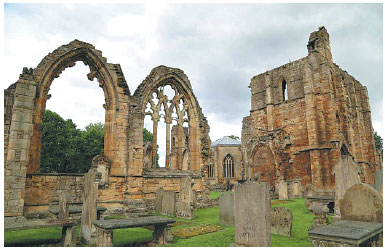Whisky, wool and walking in Speyside
By Michelle Locke in Aberlour, Scotland (China Daily) Updated: 2017-01-16 08:38Forget the three Rs. I went to Speyside, Scotland's "single-malt capital of the world", to brush up on the three Ws: whisky, wool and walking.
Striding beside the River Spey on a misty afternoon, a warm sweater from a local mill wrapped around my shoulders, an even warmer dram of whisky awaiting me at my hotel ahead, I realized I'd reached peak Speyside status.
Educational mission accomplished. Or, to quote Scottish poet and noted whisky fan Robert Burns: "Gie me ae spark of Nature's fire/That's a' the learning I desire."
Dreaming of drams and doing a little whisky wandering of your own? Here are a few pointers to the Speyside region's must-sees.
Getting there
Speyside is located in northeastern Scotland, and the closest airport is Inverness. From there, you can rent a car or take the train to the Elgin, Aviemore or Keith stations, whichever is closest to your accommodations. If you are traveling from London, you may want to consider the Caledonian Sleeper that runs from Euston station to Inverness and is a fun way to step back in time to a slower and more gracious form of transport.
Where to stay
Dufftown is home to several distilleries and has rail service to Keith during the summer. You'll find a number of B&Bs here. Book ahead, since rooms are limited. The pretty village of Aberlour has the Aberlour and Cardhu distilleries as well as The Dowans Hotel, which has a very good restaurant and well-stocked whisky bar, plus rooms ranging from small but well-designed singles that start at around $100 a night to luxe suites. In the heart of the village, you'll find The Mash Tun, a whisky bar and restaurant with four rooms. Also of note is the Quaich bar in the Craigellachie Hotel, home to hundreds of whiskies.
Getting around
There are buses, but car is the easiest way to get around. If you're not renting, you can book a driver by the day or take taxis. Since taxis are limited, it's best to ask your hotel or B&B host to set up rides a day ahead.
Whisky
Speyside is known for its single malts, whiskies made at a single distillery from malted grain, usually barley. Big names include The Glenlivet, Glenfiddich and The Macallan. More than a dozen distilleries are open to the public. Pick the ones that mean the most to you for whatever reason and plan accordingly.
The area hosts an annual Spirit of Speyside Whiskey Festival. The next is scheduled for April 27-May 1.
Three distilleries to consider:
Glenfidditch and Balvenie are neighboring Dufftown distilleries that offer contrasting experiences.
At Glenfiddich, you'll tour the distillery, visit the warehouses where the barrels age and finish up with a tasting. Tours start at around $13, reservations recommended.
The Balvenie distillery has a traditional, working malting floor as well as its own cooperage on site. It's recommended you book four weeks ahead. Tours start at $50, and for an extra $30 or so you can bottle your own bottle of Balvenie.
Glenfiddich has a restaurant, and just around the corner are the atmospheric ruins of Balvenie Castle, which is open to visitors April-September. Check out the nearby field - you may see some Highland cattle with their adorably fringed faces.
The Macallan is in Craigellachie and is the whisky James Bond likes to drink. Construction is underway on a new distillery; check the website for traffic information.
The Six Pillars tour, at about $19, offers an excellent and in-depth look into what goes into making and aging a single malt whisky and finishes with a tasting of four whiskies. Reservations are required. The distillery is set in an extensive estate backing on to the Spey, and visitors can walk around the area.
Walks
The Speyside Way runs about 105 km from Buckie, on the northeast coast, to Aviemore, near the Cairngorm mountains. Bikes are allowed on some parts of the route.
Wool
Elgin is home to Johnstons of Elgin, maker of fine cashmere.
Free guided tours of the mill are available; to reserve ahead to make sure you're not disappointed.
If you are at all into cashmere goods, this is well worth the time.
You'll follow the life cycle of cashmere, from fluffy ball of uncarded fiber to the colorful, chattering looms that weave fabric into the lush scarves, knitwear and other finished products.
A restaurant is on site - the scones are highly recommended - and, of course, there's a well-stocked gift shop.
Just across the street are the stark yet elegant ruins of Elgin Cathedral, open April-September.
In the village of Knockando, you'll find the historic Knockando Woolmill, which has been producing woven fabric for 200 years and has a pretty garden setting, a gift shop selling unique woven goods and an excellent small cafe. Closed during the winter, it opens for the season in March.
|
The ruins of Elgin Cathedral in Elgin, in Scotland's Speyside region. The cathedral is across the street from Johnstons of Elgin, the maker of fine cashmere.Michelle Locke Via AP |
- 'Cooperation is complementary'
- Worldwide manhunt nets 50th fugitive
- China-Japan meet seeks cooperation
- Agency ensuring natural gas supply
- Global manhunt sees China catch its 50th fugitive
- Call for 'Red Boat Spirit' a noble goal, official says
- China 'open to world' of foreign talent
- Free trade studies agreed on as Li meets with Canadian PM Trudeau
- Emojis on austerity rules from top anti-graft authority go viral
- Xi: All aboard internet express












